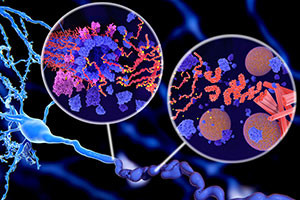Biointerface engineering is an essential part of medical research into new treatments, cures and vaccines. In this course, you will learn about biointerface engineering with a focus on protein aggregation and biomaterials, analysing their role in the medical world. Firstly, you are introduced to the processes involved in forming protein aggregates and its effects. You will discover the methods used to characterise protein aggregation and the factors that affect it. Then, study the kinetics of protein aggregation, its various pathways, and the aggregation process in bulk. After that, explore the process on surfaces, followed by how to determine the rate of aggregation. The effects of surfaces on the aggregation of proteins is discussed using the insulin model protein example. The concept of modified surfaces is introduced, and the wettability of surfaces with mono and mixed self-assembled monolayers (SAMs) is explained.
Study the effect of surface roughness on adsorption and the therapeutic solution to the protein aggregation process. Learn about host responses to biomaterials where surface-biomolecular interactions, host cell response and hemostasis are explained in detail. The sequence of reactions that occur when the body detects an injury or intrusion by a foreign object will be examined. You will also discover the application of inflammation mediators while exploring the factors that affect the cell-surface interactions. Cell adhesion, a critical part of the wound-healing process, will be introduced, and you will study how it works. The phenomenon of cell adhesion kinetics will also be examined. Lastly, you will be introduced to biocompatibility, the different classes of biomaterials, and the techniques for assessing biocompatibility. The characteristic of cytotoxicity will be contrasted to that of cytocompatibility as the various biological responses are uncovered. Though these topics and terminologies seem complex, they will be related systematically using examples that relate to your experiences in the real world.
The importance of biointerface engineering in biomedical research cannot be overemphasised. This course is designed for practising and aspiring medical research, diagnostics, and pharmacology professionals. It is also intended to benefit those in the world of academia, including lecturers, tutors and research fellows. If you are a medical practitioner, a nurse, a clinical officer, or laboratory assistant, you will find this course refreshing as you grow your knowledge base and relate it with your work experiences. The knowledge gained will reinforce the skills you already have and build a formidable résumé when coupled with your work experience. If you are a medical student or an aspiring professional in any of the fields mentioned above, this course will build a solid foundation for your future career. You can register for free, today.
What You Will Learn In This Free Course
View All Learning Outcomes View Less All Alison courses are free to enrol, study, and complete. To successfully complete this Certificate course and become an Alison Graduate, you need to achieve 80% or higher in each course assessment.
Once you have completed this Certificate course, you have the option to acquire an official Certificate, which is a great way to share your achievement with the world.
Your Alison certificate is:
- Ideal for sharing with potential employers.
- Great for your CV, professional social media profiles, and job applications.
- An indication of your commitment to continuously learn, upskill, and achieve high results.
- An incentive for you to continue empowering yourself through lifelong learning.
Alison offers 2 types of Certificate for completed Certificate courses:
- Digital Certificate: a downloadable Certificate in PDF format immediately available to you when you complete your purchase.
- Physical Certificate: a physical version of your officially branded and security-marked Certificate
All Certificate are available to purchase through the Alison Shop. For more information on purchasing Alison Certificate, please visit our FAQs. If you decide not to purchase your Alison Certificate, you can still demonstrate your achievement by sharing your Learner Record or Learner Achievement Verification, both of which are accessible from your Account Settings.
















 Avg. Hours
Avg. Hours  Contains Video
Contains Video  CPD Accredited
CPD Accredited 
 Total XP:
Total XP: 
 Knowledge & Skills You Will Learn
Knowledge & Skills You Will Learn 


